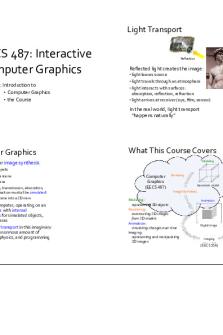Feb 1, 2018 - Lecture notes 1 PDF

| Title | Feb 1, 2018 - Lecture notes 1 |
|---|---|
| Author | tammy baez |
| Course | Developmental Psychology |
| Institution | John Jay College of Criminal Justice |
| Pages | 3 |
| File Size | 53.8 KB |
| File Type | |
| Total Downloads | 36 |
| Total Views | 128 |
Summary
Themes in Child Development ...
Description
Themes in Child development 1.Continuity of development a. Are we constantly changing across development? Or do we make big shifts to qualitatively new behavior? b. Discontinuous: Do we make big shifts to qualitatively new behavior? c. Continuous: Are we constantly changing across development? 2. Nature and nurture a. Nature: biological endowment b. Nurture: influence of the environment; physical and social 3. The "active" child a. Active/passive child: to what degree do children influence their own development b. Passive: children are at the mercy of their environment c. Active: children are participating in their own development Link between themes is trying to connect and see what makes you, you? 5 foundational theories of child development 1. Biological perspective 2. Learning perspective 3. Psychodynamic perspective 4. Cognitive development 5. Contextual Biological Perspective ● Key assumption: Development is rooted in biology Famous theories Maturational theory: child development reflects a specific nad prearranged scheme or plan within the body. - Dr. Arnold Gesell ● fails to consider any major environmental factors. Ethological theory: views development from an evolutionary perspective ● Behaviors are adaptive; we develop in a certain way because it aids in our survival Critical period: the time in development when a specific type of learning can take place; before or after the critical period, the same learning is difficult or even impossible. E.g., Konrad Lorenz & Imprinting.
Learning Perspective ● Key assumption: development is determined largely by a child’s environment Skinner's operant conditioning: consequence of behavior determine whether behavior is repeated. ● Reinforcement: increases likelihood of the behavior that it follows ● punishment : decreases the likelihood of the behavior that it follows. Social Cognitive Theory: behaviors develop as children observe a combination of reward, punishment and other’s behaviors. ● Monkey see monkey do Psychodynamic Perspective: ● Key assumption: development unfolds according to the resolution/lack of resolution of conflicts at different stages. Psychodynamic theory: Freudian Theory, early experiences establish patterns that endure throughout a person’s life. ● Conflict: ○ Id (primitive instinct) ○ Ego (rational/practical aspect) ○ Superego (moral agent) Psychosocial Theory: development consist of a sequence of stages, each defined by a key crisis/challenge. Cognitive-Developmental Perspective ● Key assumption: development reflets children trying to make sense of the world. Piaget’s Theory: different stages of stages of thinking that develop through children’s shifting competencies and changing theories of the world.
Contextual Perspective: ● Key assumption: development is driven by the interaction of a child’s immediate and distant environments (all nurture, but includes both direct and indirect influences) Sociocultural Theory: emphasizes the roles “experts” in conveying cultural
expectations and knowledge to the next generation....
Similar Free PDFs

Feb 1, 2018 - Lecture notes 1
- 3 Pages

Lecture 7 Notes Feb 25
- 5 Pages

Lecture-1 - Lecture notes 1
- 6 Pages

1 - Lecture notes 1
- 11 Pages

1 - Lecture notes 1
- 5 Pages

1 - Lecture notes 1
- 1 Pages

1 - Lecture notes 1
- 24 Pages

Lecture notes, lecture 1
- 9 Pages

Lecture notes, lecture 1
- 4 Pages

Lecture-1-notes - lecture
- 1 Pages

Lecture notes- Lecture 1
- 20 Pages

Lecture notes, lecture 1
- 4 Pages

Lecture notes, lecture 1
- 9 Pages
Popular Institutions
- Tinajero National High School - Annex
- Politeknik Caltex Riau
- Yokohama City University
- SGT University
- University of Al-Qadisiyah
- Divine Word College of Vigan
- Techniek College Rotterdam
- Universidade de Santiago
- Universiti Teknologi MARA Cawangan Johor Kampus Pasir Gudang
- Poltekkes Kemenkes Yogyakarta
- Baguio City National High School
- Colegio san marcos
- preparatoria uno
- Centro de Bachillerato Tecnológico Industrial y de Servicios No. 107
- Dalian Maritime University
- Quang Trung Secondary School
- Colegio Tecnológico en Informática
- Corporación Regional de Educación Superior
- Grupo CEDVA
- Dar Al Uloom University
- Centro de Estudios Preuniversitarios de la Universidad Nacional de Ingeniería
- 上智大学
- Aakash International School, Nuna Majara
- San Felipe Neri Catholic School
- Kang Chiao International School - New Taipei City
- Misamis Occidental National High School
- Institución Educativa Escuela Normal Juan Ladrilleros
- Kolehiyo ng Pantukan
- Batanes State College
- Instituto Continental
- Sekolah Menengah Kejuruan Kesehatan Kaltara (Tarakan)
- Colegio de La Inmaculada Concepcion - Cebu


